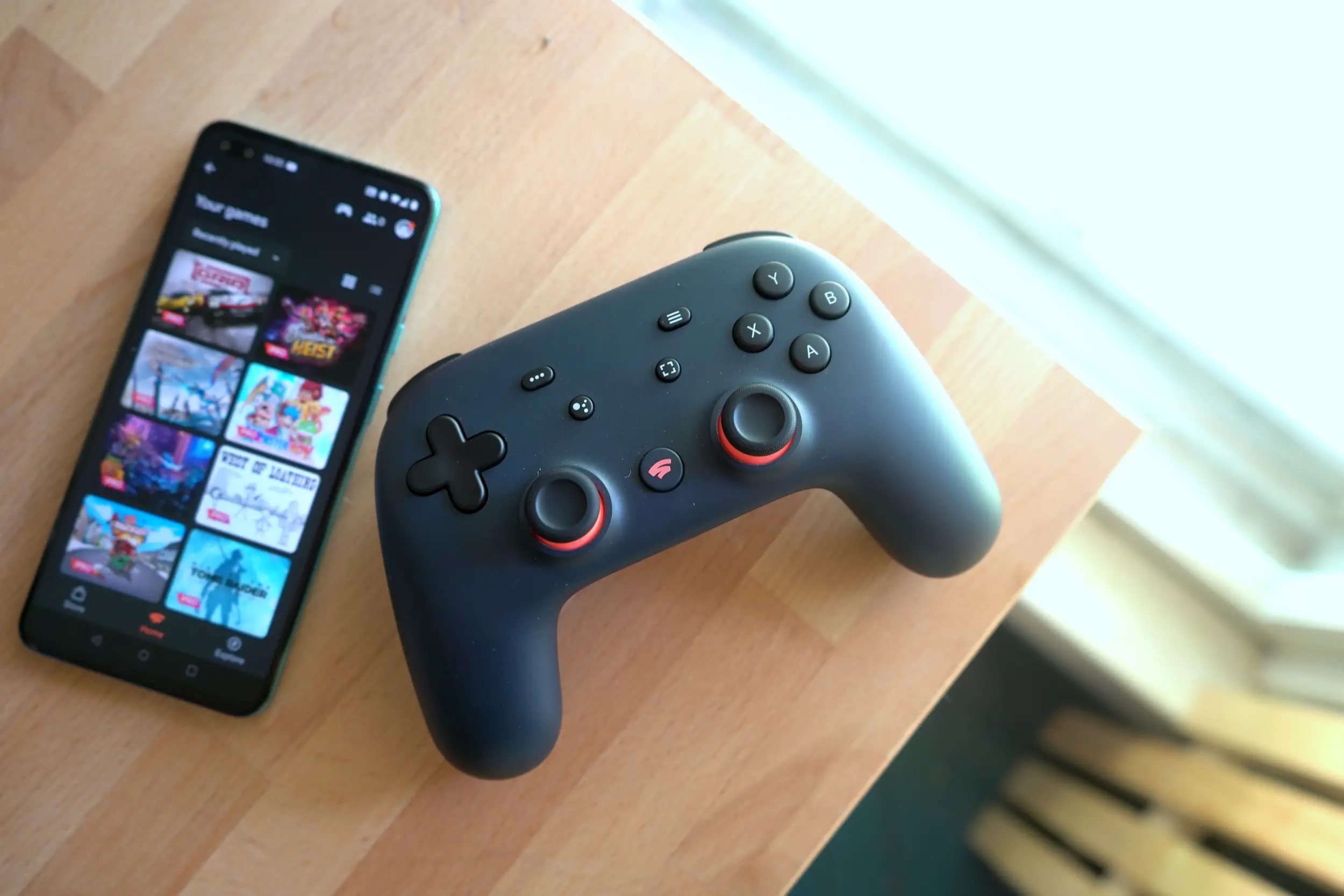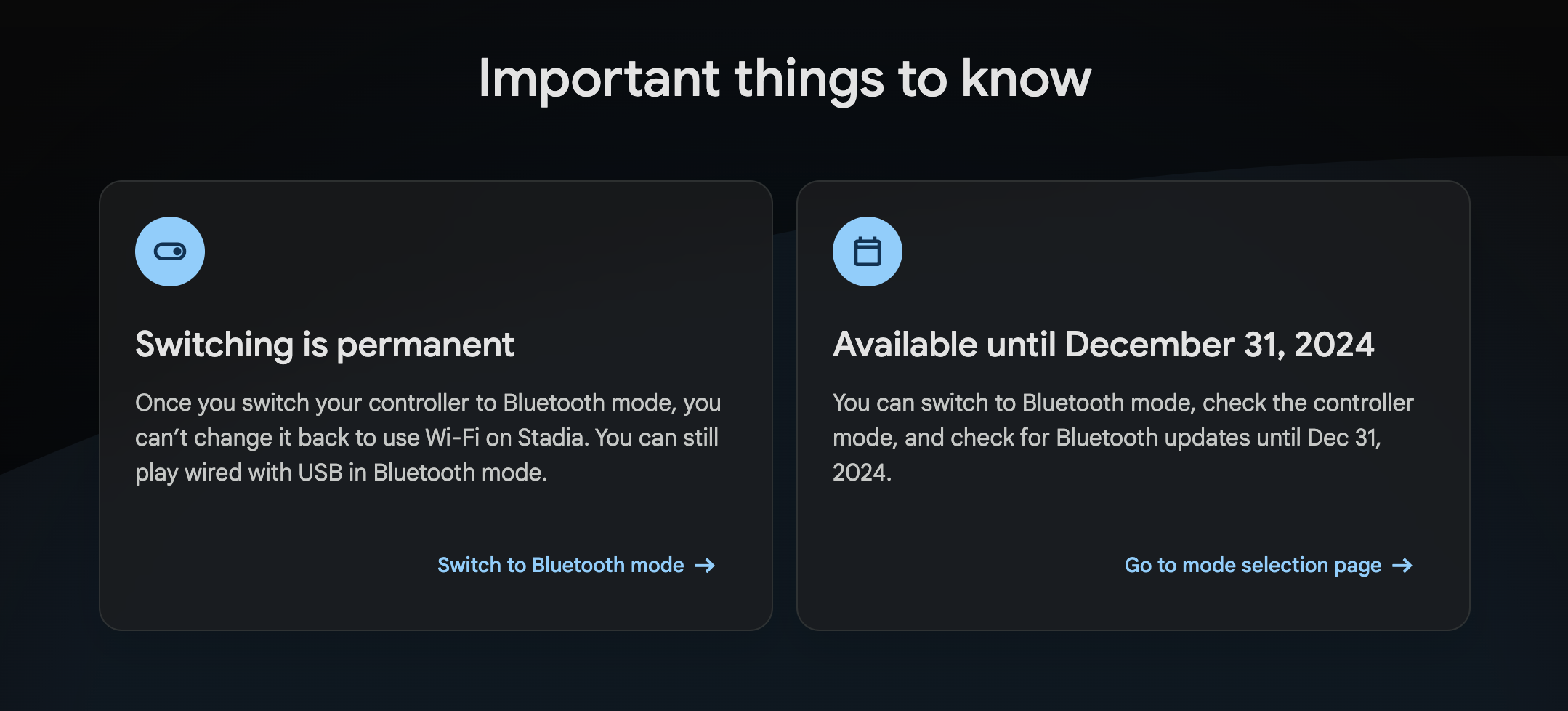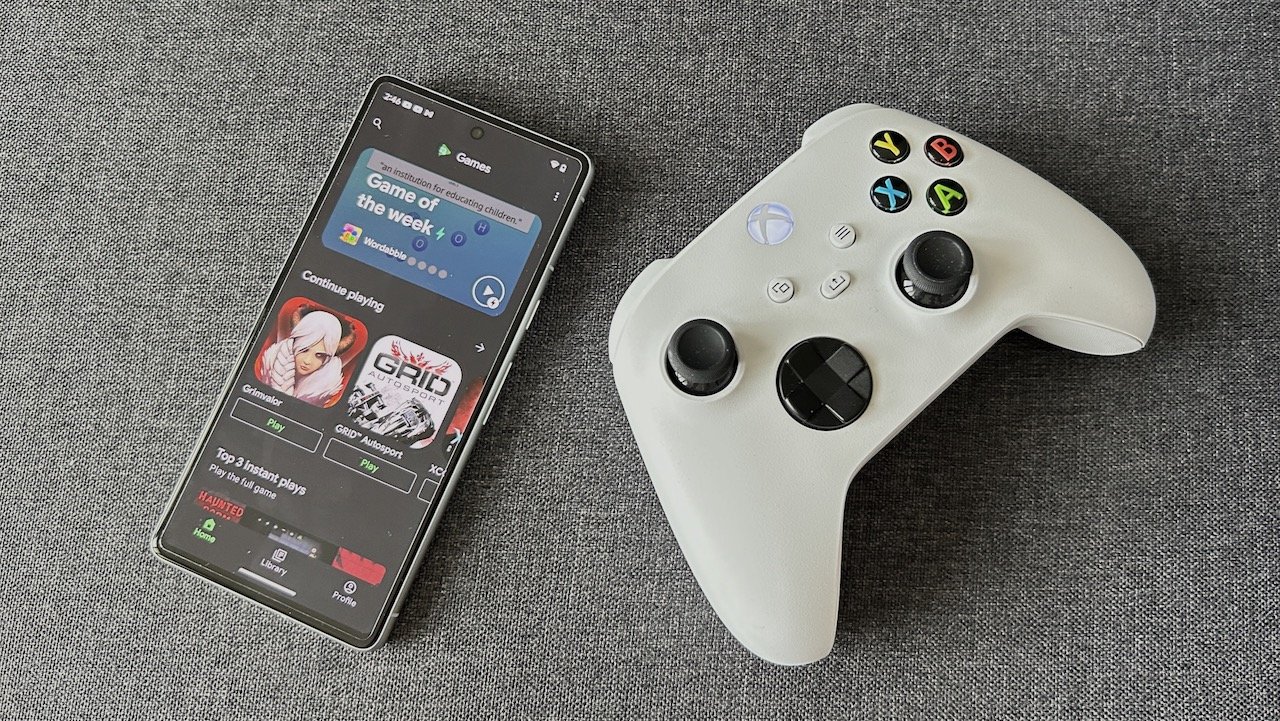
While the unfortunate demise of Google Stadia was a major blow to users who invested a lot of time and money into the ill-fated cloud-based gaming platform, Google did somewhat make up for this by issuing users refunds on most purchases, even going so far as to enable players to use their Stadia controller as a standard Bluetooth gamepad.
With a method players were able to use their Stadia controller with other devices such as smartphones and computers, a feature which wasn't originally available as Stadia used a different kind of wireless connectivity method with the controllers. That being said, Google initially specified that owners only had until the end of 2023 to "convert" their controllers.

It looks like Google has extended this deadline, though - Twitter/X user Wario64 spotted a change on the official Stadia Controller webpage, which now states that this method will be accessible throughout 2024. It should also be noted that once this method is performed on a Stadia controller, it will forever continue to function as a "regular" Bluetooth gamepad.
In our experience, converting the Stadia controller over to a more standard Bluetooth connectivity mode works well with laptops and computers, although it does require a bit of time to setup. In any case, it's a nice way to repurpose otherwise obsolete hardware from a failed product.

Apple and Google are currently dominating the smartphone space, especially Google where their own app store is on pretty much nearly every Android device out there in the market today. This is a huge deal because all purchases made will see a portion of that money go to Google in commission fees.
Given the popularity of some mobile games and the millions of dollars that can be made through in-app purchases, it's not surprising that Microsoft now wants in on the action. Phil Spencer, Microsoft's head of the Xbox division, has confirmed that the company is in talks with various partners about the launch of a mobile game store.
Microsoft currently has their own storefront for Windows apps, but a mobile game store could be a great alternative for developers of mobile games who might not want to pay the commission that Apple and Google takes. Presumably Microsoft could be offering a lower cut compared to Apple and Google otherwise it's hard to imagine why developers would go with them instead of using Apple or Google's native app stores.
That being said, there are definitely challenges that lie ahead for Microsoft. Firstly, they would need to convince customers to download or use a separate app store for games, especially if users prefer to consolidate all their apps. Secondly, there could be an issue with Apple, who at the moment still does not allow third-party app stores on its iOS platform.
The EU does have a law that is coming into effect that would effectively force Apple to open up its ecosystem, but Apple is fighting it and it remains to be seen how that will turn out.
In the ever-evolving landscape of gaming, staying ahead of the curve requires more than just skill—it demands the right gear. As we step into 2023, the world of gaming gadgets for PC has reached new heights, offering enthusiasts an array of cutting-edge tools to elevate their gaming experience. From immersive virtual reality setups to lightning-fast gaming peripherals, the market is teeming with innovations designed to push the boundaries of what's possible. In this dynamic era of technology, choosing the right arsenal of gadgets can be a daunting task. Fear not, as we present the definitive list of the top must-have gadgets for gaming enthusiasts in 2023. Whether you're a seasoned gamer or just entering the realm, this curated selection is your guide to unlocking the next level of gaming excellence. Embrace the future of gaming with these essential tools that promise to redefine the way you play.
1. Logitech G Cloud Gaming Handheld
Step into the future of gaming with the Logitech G Cloud Gaming Handheld. This revolutionary device lets enthusiasts carry their gaming sanctuary in their hands, providing on-the-go access to a vast array of cloud-based games. Pick a game here from SlotsUp's collection of free video slots with bonus rounds and start playing. Experience console-quality graphics and seamless gameplay without being tethered to a specific location. The Logitech G Cloud Gaming Handheld offers unparalleled flexibility, ensuring that your gaming adventures are not bound by physical constraints. Elevate your gaming experience now by embracing this portable powerhouse, where the thrill of gaming knows no bounds.
2. Xbox Series S Fortnite & Rocket League Bundle
Embark on an unparalleled gaming journey with the Xbox Series S Fortnite & Rocket League Bundle. This gaming powerhouse not only delivers the cutting-edge performance of the Xbox Series S console but also comes bundled with the exhilarating worlds of Fortnite and Rocket League. Immerse yourself in top-tier graphics, responsive controls, and the thrill of competitive play. Elevate your gaming arsenal by seizing this bundle — a gateway to an immersive universe of gaming excitement. The Xbox Series S Fortnite & Rocket League Bundle is your ticket to unparalleled gaming nirvana.
3. GAEMS Guardian Pro Xp
Revolutionize your gaming lifestyle with the GAEMS Guardian Pro Xp. This portable gaming fortress offers an immersive on-the-go experience with its built-in monitor and console compatibility. Elevate your gaming setup to new heights by ensuring that wherever you roam, your gaming sanctuary follows. The GAEMS Guardian Pro Xp combines convenience with top-notch visuals, delivering a seamless gaming experience. Break free from traditional constraints and embrace the future of portable gaming. In 2023, make the Guardian Pro Xp an essential part of your gaming toolkit, turning any space into a haven for uninterrupted gaming pleasure.
4. Razer Raptor 27″ Gaming Monitor
The Razer Raptor 27″ Gaming Monitor secures its spot as a top-tier essential for gaming enthusiasts. Boasting a 144Hz refresh rate and 1ms response time, it delivers an immersive, lag-free gaming experience. The 27-inch IPS display, with QHD resolution and HDR support, showcases vivid colors and sharp details. Designed with Razer's signature aesthetics, its customizable Chroma RGB lighting adds flair to your gaming setup. Adaptive Sync technology reduces screen tearing, while the built-in cable management ensures a clean, organized space. Elevate your gaming visuals with the Razer Raptor 27, a monitor that blends performance and style seamlessly.
5. WOWCube - Digital Cube with Games and Apps
Enter the realm of innovation with the WOWCube - a digital cube that transcends traditional gaming. This futuristic gadget seamlessly blends the tactile joy of a handheld cube with a digital playground of captivating games and apps. Offering a unique, interactive experience, the WOWCube is a revolutionary addition to the gaming landscape in 2023. Immerse yourself in a world where entertainment and innovation converge, shaping a gaming future that defies expectations. Elevate your gaming repertoire with WOWCube's ingenuity, a must-have for enthusiasts seeking an immersive and interactive gaming adventure like never before.
6. Smart Glasses
Step into the future of gaming with smart glasses, a revolutionary gadget taking immersive gameplay to new heights. These cutting-edge spectacles seamlessly blend the virtual and real worlds, providing gamers with an augmented reality experience like never before. Enjoy enhanced graphics, interactive overlays, and intuitive controls right before your eyes, creating a truly immersive gaming environment. With features like eye-tracking technology and holographic displays, smart glasses redefine how we interact with digital worlds. Elevate your gaming escapades and embrace a new dimension of play with these futuristic glasses that promise to transform your gaming sessions into unforgettable adventures.
7. LG UltraGear RGB Gaming Speaker
Unleash the power of sound with the LG UltraGear RGB Gaming Speaker, a must-have gadget for gamers. This audio marvel not only delivers crystal-clear sound but also elevates your gaming setup with customizable RGB lighting. Immerse yourself in a symphony of high-fidelity audio and dynamic visuals as the speaker syncs with your gameplay, creating an ambient spectacle. With precision-tuned acoustics and sleek design, LG UltraGear transforms your gaming space into a multisensory arena. Elevate every battle, soundtrack, and dialogue with this audio masterpiece, setting a new standard for immersive gaming experiences.
8. Meta Quest 2
At the forefront of virtual reality gaming, the Meta Quest 2 takes center stage. This sleek and wireless headset delivers an unparalleled gaming experience, allowing enthusiasts to dive into immersive worlds with ease. Explore a new dimension of cool gadgets for gaming with the Meta Quest 2, boasting enhanced graphics and a vast library of titles, serving as a gateway to limitless adventures. With its untethered design, powerful processing, and intuitive controls, the Meta Quest 2 redefines the boundaries of gaming. From heart-pounding action to mesmerizing simulations, this gadget seamlessly marries cutting-edge technology with unparalleled convenience, making it an indispensable companion for every gaming enthusiast seeking the pinnacle of virtual reality.
9. 8Bitdo SN30 Gaming Controller
The 8Bitdo SN30 Gaming Controller reigns supreme in 2023, offering gaming enthusiasts a versatile masterpiece. Compatible with Windows, Android, and Nintendo platforms, this controller seamlessly transitions between devices, ensuring a unified gaming experience. Explore the world of gaming gadgets for mobile with the 8Bitdo SN30, a versatile controller that allows you to conquer levels on your PC, dominate opponents on Android, or navigate Nintendo's vast gaming universe. With its retro-inspired design, ergonomic feel, and responsive buttons, it's a nostalgic nod to the past with all the modern functionalities. The 8Bitdo SN30 is your key to precision control and uninterrupted gaming bliss across multiple platforms.
10. Samsung 49-Inch CRG9 Curved Monitor
Immerse yourself in unparalleled gaming experiences with the Samsung 49-Inch CRG9 Curved Monitor, a standout among our top 10 must-have gadgets for gaming enthusiasts. Boasting a breathtaking 49-inch curved display, this monitor delivers a panoramic view that engulfs you in the heart of the action. With a 120Hz refresh rate and a crisp 5120 x 1440 resolution, it ensures smooth gameplay and stunning visuals. The dual QHD resolution across the expansive screen provides a competitive edge, making the CRG9 a gaming powerhouse. Elevate your gaming setup with this cutting-edge monitor, where every detail comes to life in vibrant color and dynamic clarity.
Summary
Unveiling the gaming future in our research where innovation meets exhilaration. Amid the tech revolution, anticipate the unexpected with groundbreaking gadgets that redefine gaming excellence. From immersive VR headsets to lightning-fast gaming laptops, each entry in our 2023 lineup pushes the boundaries of what's possible. Read here about how gadgets have changed the way we play slots, and elevate your gaming prowess with cutting-edge technology, ensuring an unprecedented level of excitement and interactivity. Stay ahead of the curve in the gaming landscape with our curated selection of must-have gadgets, promising an unparalleled gaming experience in the dynamic year ahead.

Welcome to the world of mobile sweepstakes casinos where promo codes can be your keys to unlocking a world of bonuses and great rewards. Promo codes gift players a treasure trove of free credits, spins and delightful surprises, elevating the gaming experience and bolstering the chances of making some good wins.
Yet, in this realm of possibilities, not all promo codes are the same and the quest to unearth the finest ones can be as adventurous as the games themselves. So, come with us as we help you uncover promo codes for sweepstakes casinos, ensuring you make the most of these incentives for your gaming experience.
Official Casino Websites
The first place to check for promo codes is the official websites of mobile sweepstakes casinos. Many casinos offer exclusive codes to their loyal players or those who sign up for their newsletters. These codes can grant access to special promotions, cashback offers or free spins. Regularly visiting the casino's website and subscribing to their updates can help you stay in the loop about the latest promo codes.
Social Media Platforms and Casino Apps
Casinos often use social media to connect with their players and share promo codes. Follow your favorite mobile sweepstakes casinos on platforms like Facebook, Twitter and Instagram to get timely updates on new codes. Sometimes, casinos even host social media contests or giveaways where you can win promo codes and other prizes.
Many mobile sweepstakes casinos have dedicated apps for players to enjoy a seamless gaming experience on their smartphones. These apps often feature special promotions and exclusive promo codes. Be sure to download the casino's app and keep an eye on in-app notifications for any new codes and offers.
Casino Forums and Communities
Joining casino forums and online communities can be an excellent way to discover promo codes that other players share. Websites like Reddit, CasinoMeister or specific casino forums often have dedicated threads where members post the latest codes they've found. However, exercise caution and make sure to verify the authenticity of the codes, as some may be outdated or invalid.
Affiliate Websites
There are numerous affiliate websites that are dedicated to providing players with the latest and most exclusive promo codes for mobile sweepstakes casinos. These sites have established relationships with casinos and can offer codes that are not widely available elsewhere. However, be discerning when choosing affiliate websites and ensure they have a good reputation for reliability and accuracy.
Email Newsletters
Subscribing to email newsletters from mobile sweepstakes casinos can be a great way to receive personalized promo codes and offers directly in your inbox. Casinos often send out exclusive deals to their email subscribers and these codes can sometimes be more generous than the ones available to the general public.
Review and Bonus Websites
Review and bonus websites are dedicated to providing players with comprehensive information about mobile sweepstakes casinos, including reviews, ratings and, most importantly, the latest promo codes. These websites often have partnerships with casinos and can provide unique codes you won't find anywhere else.
Conclusion
Mobile sweepstakes casinos open the doors to a thrilling realm of entertainment for online casino gamers. Promo codes offer the keys to unlock the fun at these casinos through the bonuses they unveil.
But with any online casino bonus, there are rules to take note of. Promo codes may come with their own set of terms and conditions which you should not ignore. Always read and understand the rules before making use of a promo code.
With these codes and paying attention to their terms and conditions, you're set to explore and have a fun experience at mobile sweepstakes casinos. As you spin the reels and chase the dream, remember that the odds may be fickle, but fortune favors the fearless. So, go forth, game on and may the codes lead you to pleasure.
Casino gambling is an age-old pastime that has been enjoyed by people all over the world. It is a popular form of entertainment that offers the thrill of taking risks and the potential to win big. People are drawn to the excitement and rush that comes with playing various casino games, such as blackjack, poker, roulette, and slot machines.
One of the main reasons why people enjoy casino gambling so much is the adrenaline rush it gives them. The uncertainty of whether they will win or lose adds to the excitement of the experience. The possibility of winning a large sum of money with just one lucky spin or card hand is a major motivation for many people to continue playing.
Aside from the potential of winning money, casino gambling also offers a social aspect. Many people visit casinos with their friends or loved ones, making it a fun and social experience. They can bond over the shared excitement of playing and cheering on each other's wins.
What makes the experience even more thrilling is the atmosphere of a traditional casino. The bright lights, the sounds of the slot machines, and the energy of the players all add to the overall experience. It is an escape from reality and a way to let loose and have some fun.
However, with the advancement of technology, the casino industry has seen a significant shift towards online gambling. Online casinos offer the same thrills and excitement as traditional physical casinos, but with added convenience and accessibility.
Its Advantages
One of the major advantages of online casinos is that they can be accessed from anywhere at any time. Players no longer have to travel to a physical casino to enjoy their favorite games. They can simply log on to their computer or mobile device and play from the comfort of their own home.
Online casinos also offer a wider range of the best online casino games than physical casinos. Players have access to a vast selection of traditional casino games, as well as newer and more innovative options. This variety keeps players engaged and adds to the overall enjoyment of the experience.
Additionally, online casinos often offer lucrative bonuses and promotions, enticing players to keep coming back for more. This not only adds to the fun of playing but also increases the potential for bigger wins.
Furthermore, the anonymity of online gambling allows players to focus solely on the games without any external distractions. This can enhance the overall gambling experience and make it even more enjoyable.
These very reasons make online casinos get the same love and popularity in the casino world as land-based casinos. It's a way for people to indulge in their favorite gambling activities from the comfort of their own home. The added convenience and accessibility make it possible for more people to join in on the fun and experience the thrill of casino gambling.
It's The Future of Gaming!
Online casinos have been gaining immense popularity in recent years and it's no surprise why. With the advancement of technology, online casinos have become the future of gaming. Not only do they offer the same thrills and excitement as traditional physical casinos, but they also have unique properties that make them stand out in the world of gaming.
One of the standout features of online casinos is their convenience and accessibility. As mentioned earlier, players can access online casinos from anywhere at any time, making it possible to indulge in their favorite gambling activities without leaving their homes. This allows for a more flexible and personalized gaming experience.
Moreover, online casinos are constantly evolving and innovating. They are always looking for new and exciting ways to engage and entertain their users. With the use of cutting-edge technology, online casinos are able to offer immersive and interactive experiences that were previously not possible in traditional casinos. Virtual reality (VR) and augmented reality (AR) are two technologies that have already been incorporated into the world of online gambling. They allow players to fully immerse themselves in a virtual casino environment, making the experience even more realistic and thrilling.
Another factor that makes online casinos the future of gaming is the potential for even more exciting features to be introduced in the near future. The possibilities are endless, from live streaming of games to incorporating social media elements into the gaming experience.
One of the main draws of online casinos is the ability to offer a wider range of games than traditional casinos. In the future, we can expect to see even more variety and innovation in online casino gaming. This will not only attract more players to the industry but also keep existing players engaged and coming back for more.
Moreover, online casinos also have the potential to offer a more personalized gaming experience. With the use of data and algorithms, these platforms can cater to individual player preferences, making the gambling experience even more tailored and enjoyable.
As technology continues to advance, the potential for online casinos to offer new and exciting features is limitless. It is safe to say that online casinos are the future of gaming, and we can expect to see even more thrilling and innovative developments in the coming years.
© 2023 YouMobile Inc. All rights reserved






